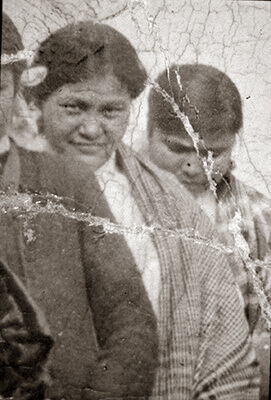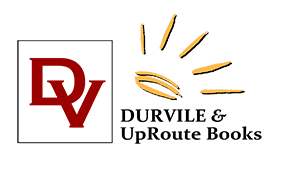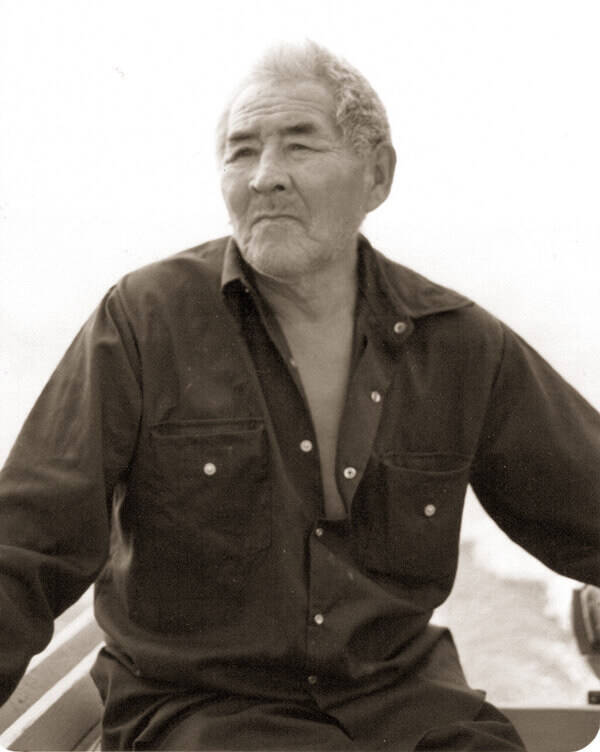EXCERPTS and AUDIO CLIP
We Remember the Coming of the White Man
Play a sample clip from the Audiobook.
-----
Read, from the Chapter, "The Sickness."

Elizabeth Yakeleya
In those days we didn’t know about TB. We didn’t know what it meant. I had twelve children but I only had two boys. The eldest learnt how to work but the second one always followed me. So I taught him how to snare and set fish nets.
He had been playing outside and when it was time for him to come in, he started bleeding from his nose. We took him to the hospital and the doctor said he was having a haemorrhage. He didn’t want to stay there and he cried but we had to leave him.
In the fall he said, “Mom, I want to go home with you.”
The doctor said, “I’m sorry. I thought he was going to get better but I don’t think he will live.”
I told him, “Even though he has TB, I will take my son and he can stay with me until his end.”
So we took him back. It was in March that he passed away. It was a beautiful morning and the sun was shining. He said, “Please take me to the window. I’ll see the sun rising.”
I kissed him and I had my tears.
“Mom Please don’t cry.”
That’s the last words he gave me.
I had twelve children, eight of them died.
When the Doctor came into the community, he examined many people and said they had TB. He sent many children away to hospital and it was a long, long time before they came back again.
When our children pass away it is a great sadness. Our Dear Lord helps us.
News of the North Story about this, March 18, 2020
Read, from the Chapter, "Oil Discovery."
Joe Blondin
Even before the news came back about the sample my grandfather had sent out, the oil rush was on. That spring half of Canada was down there. People came with dog teams, packsacks, snowshoes. Even from as far away as Alaska.
Everybody tried to get a little cut out of this oil strike. It was staked clean below Sans Sault Rapids, 70 miles below Norman Wells and 55 miles above Fort Norman. They figured that if they had property, they would have something but it didn't turn out that way. Imperial Oil had leased the property first and the
people who had come in were just froze out.
The outsiders, the money men, knew what was going on but the local individual knew nothing. All [my neighbor] knew was that he'd get something out of it but he had nothing on paper. Well who knows about documents or regulations or having a title in those days? Everybody trusted everybody else and took a man's word of honor as the truth.
We had moved back to the mountains trapping. When we came back the Government had been in there and bulldozed all our houses down the bank and put up their own buildings. Our houses used to be where the transmitter is now.
My grandfather and my dad got free gas as long as they were alive. I got two cards for free gas and oil for two years and then they disqualified me.
Right now, Norman Wells is a white community. The Natives can't even pitch a tent there. I was born and raised there but all I can do is walk the streets. They are choking us little by little.
Now this is a great joke. Imperial Oil has got a magazine called Imperial Revue. I was reading in there how Mackenzie discovered the oil in 1700 and something. Mackenzie was never around that oil! The Blondins are the ones who discovered the oil. The natives found it and never got anything and that's the truth.
CBC Media coverage of this story, Dec. 20, 2010.
Elizabeth Yakeleya
Even before the news came back about the sample my grandfather had sent out, the oil rush was on. That spring half of Canada was down there. People came with dog teams, packsacks, snowshoes. Even from as far away as Alaska.
Everybody tried to get a little cut out of this oil strike. It was staked clean below Sans Sault Rapids, 70 miles below Norman Wells and 55 miles above Fort Norman. They figured that if they had property, they would have something but it didn't turn out that way. Imperial Oil had leased the property first and the people who had come in were just froze out.
The outsiders, the money men, knew what was going on but the local individual knew nothing. All Itsen* knew was that he'd get something out of it but he had nothing on paper. Well who knows about documents or regulations or having a title in those days? Everybody trusted everybody else and took a man's word of honor as the truth.
We had moved back to the mountains trapping. When we came back the Government had been in there and bulldozed all our houses down the bank and put up their own buildings. Our houses used to be where the transmitter is now.
My grandfather and my dad got free gas as long as they were alive. I got two cards for free gas and oil for two years and then they disqualified me.
Right now, Norman Wells is a white community. The Natives can't even pitch a tent there. I was born and raised there but all I can do is walk the streets. They are choking us little by little.
Now this is a great joke. Imperial Oil has got a magazine called Imperial Revue. I was reading in there how Mackenzie discovered the oil in 1700 and something. Mackenzie was never around that oil! The Blondins are the ones who discovered the oil. The natives found it and never got anything and that's the truth.

